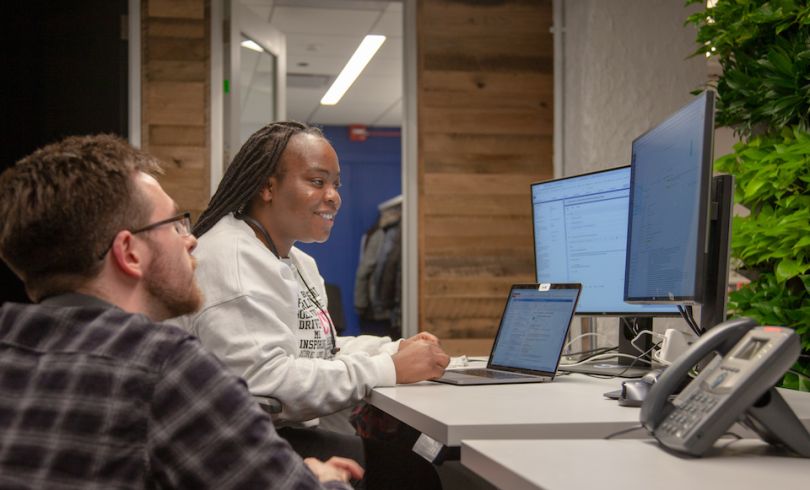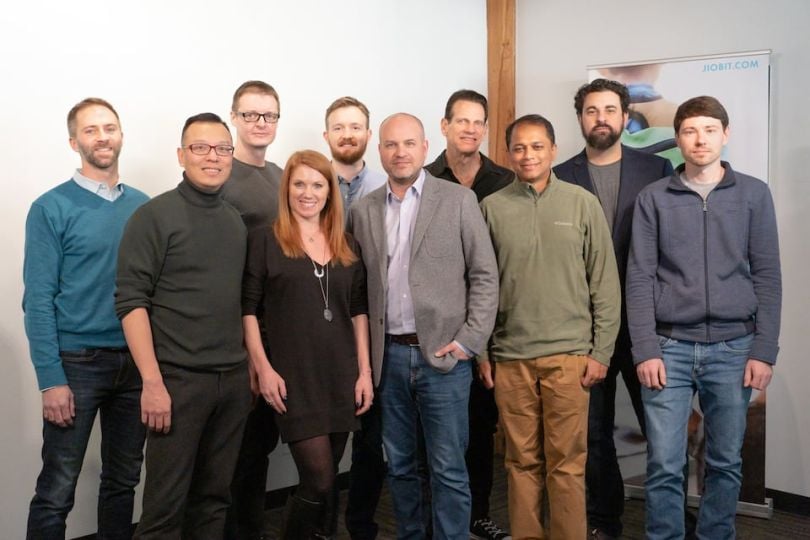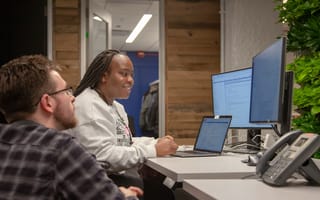Monitoring technology trends involves more than staying on top of the latest languages coming into prominence. Companies need to be able to cut through the clutter to identify the trends that will make the biggest impact on their industries and decide which ones to incorporate — or not.
A new year means new initiatives. With that in mind, we asked leaders at four Chicago tech companies about the trends they predict will make the biggest impact on their industries, and the ones they plan to incorporate into their work.

Logistics technology company project44’s visibility platform is used by companies to more accurately and efficiently track and plan shipments. CTO Will Hansmann said rising consumer shipping expectations are pushing the freight logistics industry to adopt a variety of new technologies as quickly as possible.
What technology trends do you predict will have the biggest impact on your industry in 2019 and why?
Freight logistics is going through a massive change at a rapid pace. The industry uses a term called the “Amazon Effect,” which essentially means that consumer expectations are becoming more demanding based on the experience provided by large online retailers. This is increasing the demand for insights and transparency across the supply chain.
It’s forcing an industry-wide technological overhaul where things we’ve been talking about for 15 years — big data, machine learning, IoT, electronic logging devices, modern enterprise resource planning, transportation management systems, etc. — are all being adopted very quickly. This opens the door for massive opportunities within predictive analytics to allow all of the world’s supply chains to compete on a level playing field with highly integrated channels like Amazon or Walmart.
We recognize that we need to be as responsive and nimble as possible.”
Of the trends you’re tracking, are there any you plan to incorporate into your work?
Our product and engineering teams are actively working on leveraging cloud-agnostic container technologies and serverless technologies on our stream-processing system and incorporating them in a fast, pragmatic way. We are a fast-growing tech company in a fast-moving market. Because of that, we recognize that we need to be as responsive and nimble as possible. We’re leveraging these technologies so we can grow our platform as quickly, globally and scalably as possible.

Jiobit’s location-sharing platform is designed to make it easier to keep track of children, loved ones and pets. The company’s tracker works with an accompanying app and is internet-enabled. CEO John Renaldi said the company is keeping an eye on the growth of the connected technology space — and how Jiobit’s trackers fit into it.
What technology trends do you predict will have the biggest impact on your industry in 2019 and why?
2018 was a standout year when it came to IoT and security. You couldn’t turn on the news without hearing about a major hack or security breach. At Jiobit, we’ve made data privacy a top priority with government-level encryption and industry-leading security. In 2019, we should start to see IoT companies focusing heavily on cybersecurity and protecting sensitive data.
We’re now seeing connected living, and Jiobit definitely fits into that ecosystem.”
Of the trends you’re tracking, are there any you plan to incorporate into your work?
There has been so much growth in the world of connected products. It’s not just a connected home anymore. We’re now seeing connected living, and Jiobit definitely fits into that ecosystem. We look forward to integrations within that ecosystem, like Amazon Alexa, for example.

DAIS Technology is an insurance technology startup, currently in stealth mode, that’s developing the “Internet of Insurance” to help carriers and agents work better together. Although CEO Jason Kolb expects technology to make sweeping changes across the insurance industry in 2019, he said that doesn’t necessarily mean the human touch will become any less important.
What technology trends do you predict will have the biggest impact on your industry in 2019 and why?
The insurance industry has taken its time to embrace the technological explosion. It’s been getting a lot of attention lately because there’s a lot of money in the industry, but people would be amazed at how much of that money is wasted by duplication and fragmented workflows. Behind the scenes, the industry has been slowly moving toward APIs and service-based architecture. The APIs have just matured to the point where they are useful within the last six months, which means the effects of connectivity are going to be felt starting in 2019.
It is an exciting time to be part of the rapid change. Digital transformation is going to proliferate across risk management, customer experience and process automation, opening the way for a Cambrian Explosion of modernization and network effects in the industry, and 2019 will be pivotal.
We’re really interested in human augmentation: What’s the ideal mix of human and machine, and what do they both do really well?”
Of the trends you’re tracking, are there any you plan to incorporate into your work?
We’re really interested in human augmentation: What’s the ideal mix of human and machine, and what do they both do really well? Obviously we love technology, and there are a ton of things that machines do better than people. But on the other hand, humans are also really good at a lot of things that machines are bad at, like abstract thinking and empathy.
Insurance is highly relationship-driven, and in this new world, customer experience is the only true competitive advantage. Where that line is located is really interesting, as is the question of how to create the most seamless interaction and partnership between the two from a UI and UX perspective. We have had a great opportunity to explore that within insurance and the results have been really fun to watch.

Online lender OppLoans has developed a data-driven credit scoring algorithm to provide loans to those who can’t access them through traditional means. CTO Andy Pruitt said the rise of DevOps has caused the company to rethink its approach to pre-deployment testing.
What technology trends do you predict will have the biggest impact on your industry in 2019 and why?
The DevOps revolution has gotten to the point where it’s a reality, not a trend. What I find interesting is that frictionless installation and deployment is causing us to rethink how we approach testing and multi-tenancy. Ten to 15 years ago, respectable architectures were multi-tenant SaaS. Now, we’re starting to see a shift back to a single-tenant approach, with the multi-tenancy concerns around separation of users, data and computation instead being handled by DevOps automations.
Our code is ready for production when it goes there and stays there.”
Of the trends you’re tracking, are there any you plan to incorporate into your work?
When we can build and install everything from servers, networks, databases and application deployment for our entire stack with the click of a button, we don’t need to have the application keep users and data separate. We can just put those organizations in separate AWS accounts and have confidence that they will be separate and still easy to operate and maintain.
Quick deployment and rollback has really made it much easier to quickly put new code into and out of production. When we have an app whose business purpose can be monitored in real time, we can very quickly observe whether the new code is an improvement, and if there’s a problem, we roll back, which we’re working to erase the stigma of. This has shifted some of our investment from testing to monitoring. Our code is ready for production when it goes there and stays there. We’re willing to suffer a few additional and correctable errors if that reduces the pre-deployment test burden.






